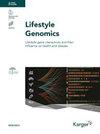Diet, DNA methylation and systemic lupus erythematosus: evidence and perspectives focused on personalized nutrition
IF 2
4区 医学
Q3 GENETICS & HEREDITY
引用次数: 0
Abstract
Background: The pathoetiology of systemic lupus erythematosus (SLE) involves a multifactorial interaction consisting of various genetic, epigenetic and environmental factors. Considering epigenetic characteristics, notable alterations in DNA methylation, particularly hypomethylation in immune-related pathways, such as T cell receptor have been observed. In turn, these alterations are associated with the overexpression of genes related to autoimmunity and a loss of immunological self-tolerance. Furthermore, DNA hypomethylation levels in SLE may contribute to disease progression and also impact disease activity and clinical manifestations. Summary: It is well-established that nutritional epigenetics elucidates the role of nutrition and dietary factors on the interactions of metabolic systems with the molecules that bind to DNA, regulating gene expression. Specific nutritional interventions may reverse initial epigenetic patterns, thereby significantly impacting the chronic disease´s treatment and prognostic. In fact, dietary nutrients and bioactive food compounds may influence DNA methylation patterns by inhibiting enzymes related to DNA methylation reactions or by altering the availability of different substrates involved in DNA methylation process (e.g methyl-donor nutrients). Key Messages: The knowledge of how diet plays a role in changing DNA methylation patterns in SLE is in the early stages. While a few studies in the literature have assessed the effects of nutrient intake, supplementation, or treatment on DNA methylation levels and have demonstrated their relevance, further research is imperative to deepen our comprehension of the interactions between epigenetics and nutrients, which is vital for the development of novel precision nutrition approaches.饮食、DNA 甲基化和系统性红斑狼疮:侧重于个性化营养的证据和观点
背景:系统性红斑狼疮(SLE)的病理生理学涉及由各种遗传、表观遗传和环境因素组成的多因素相互作用。考虑到表观遗传学特征,已观察到 DNA 甲基化的显著改变,尤其是免疫相关通路(如 T 细胞受体)中的低甲基化。反过来,这些改变又与自身免疫相关基因的过度表达和免疫自身耐受性的丧失有关。此外,系统性红斑狼疮的 DNA 低甲基化水平可能会导致疾病进展,并影响疾病活动和临床表现。摘要:营养表观遗传学阐明了营养和膳食因素对代谢系统与结合到DNA上的分子相互作用的作用,从而调节基因表达。特定的营养干预可以扭转最初的表观遗传学模式,从而对慢性疾病的治疗和预后产生重大影响。事实上,膳食营养素和生物活性食物化合物可通过抑制与 DNA 甲基化反应有关的酶或改变参与 DNA 甲基化过程的不同底物(如甲基供体营养素)的可用性来影响 DNA 甲基化模式。关键信息:关于饮食如何在改变系统性红斑狼疮 DNA 甲基化模式中发挥作用的知识尚处于早期阶段。虽然文献中的一些研究已经评估了营养素摄入、补充或治疗对DNA甲基化水平的影响,并证明了其相关性,但进一步的研究对于加深我们对表观遗传学和营养素之间相互作用的理解是势在必行的,这对于开发新型精准营养方法至关重要。
本文章由计算机程序翻译,如有差异,请以英文原文为准。
求助全文
约1分钟内获得全文
求助全文
来源期刊

Lifestyle Genomics
Agricultural and Biological Sciences-Food Science
CiteScore
4.00
自引率
7.70%
发文量
11
审稿时长
28 weeks
期刊介绍:
Lifestyle Genomics aims to provide a forum for highlighting new advances in the broad area of lifestyle-gene interactions and their influence on health and disease. The journal welcomes novel contributions that investigate how genetics may influence a person’s response to lifestyle factors, such as diet and nutrition, natural health products, physical activity, and sleep, amongst others. Additionally, contributions examining how lifestyle factors influence the expression/abundance of genes, proteins and metabolites in cell and animal models as well as in humans are also of interest. The journal will publish high-quality original research papers, brief research communications, reviews outlining timely advances in the field, and brief research methods pertaining to lifestyle genomics. It will also include a unique section under the heading “Market Place” presenting articles of companies active in the area of lifestyle genomics. Research articles will undergo rigorous scientific as well as statistical/bioinformatic review to ensure excellence.
 求助内容:
求助内容: 应助结果提醒方式:
应助结果提醒方式:


